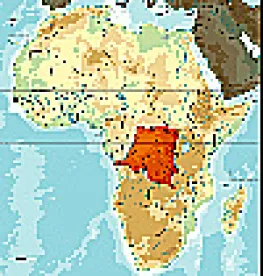On September 20, barring any breakthroughs in the political dialogue between President Kabila and opposition groups, the Democratic Republic of Congo (DRC) will enter a state of constitutional crisis. This could threaten some of the democratic gains that have been made in the country in recent years.
The political trouble in the DRC has been unfolding in slow motion, with observers cautioning against the perils of the slippage in the electoral timetable, or “glissement,” for well over a year. (See our post from last October on the electoral slippage.) Since then, the glissement has only gotten worse, and the comprehensive electoral calendar that the Electoral Commission (CENI) published in early 2015—scheduling presidential and National Assembly elections for November 27 and the inauguration of the new president on December 19—has entirely crumbled. Little has actually been done in the necessary work of registering new voters, and the head of CENI, Corneille Nangaa, announced two weeks ago that updating the national electoral roll would actually take at least a year to complete and that elections should be delayed until July 2017, if not later. In turn, President Kabila has stated that he intends to stay in office until an election takes place. This means that President Kabila would remain in power until then, well beyond the constitutional limit. Opposition leaders have assailed the delays in updating the electoral roll, claiming that this is just a subterfuge to keep President Kabila in power beyond the end of his second five-year mandate on December 19.
The problem is—at least on the surface—one of constitutional interpretation. The Congolese opposition points to Article 73 of the DRC’s constitution, which states that CENI must schedule the election 90 days before the end of the incumbent president’s term. This would mean that, to comply with the constitution, CENI must declare the beginning of the official electoral period no later than September 20. However, President Kabila and his supporters point to Article 70, which provides that the President, at the end of his five-year term, shall remain in office until a successor effectively assumes his functions. In May, the Constitutional Court ruled that President Kabila could legally remain in office until his successor is inaugurated—which President Kabila’s supporters have characterized as a mere “prolongation,” not a whole other “term.”
The halting effort over the last nine months to start a “political dialogue” between President Kabila and opposition groups finally resulted last week in the preliminary meeting (link in French) of a preparatory committee in Kinshasa, which is ongoing and aims to reach consensus on the normative and logistical elements of the actual dialogue itself. The most pressing issues to determine in a future political dialogue would be, first, how to arrange for a free, fair, and transparent electoral process that follows the Constitutionally-required timetable, and second, what should be done if a solution is not reached by December 20. A number of opposition leaders, most notably Moïse Katumbi and Étienne Tshisekedi, boycotted the meeting of the preparatory committee and supported a nation-wide strike on August 23.
International actors have taken a range of actions aimed to forestall a crisis and encourage free, fair, and timely elections. Most visibly, the African Union-appointed negotiator, Edem Kojo, has worked hard to jumpstart a political dialogue. MONUSCO, the United Nations peacekeeping and stabilization mission in the DRC, has also played a part. Aside from providing logistical support to CENI, MONUSCO has deployed strategically during large-scale, peaceful opposition rallies, and its presence has been credited for the absence of violence by the Congolese police during such events.
Moreover, the U.S. has started imposing targeted sanctions (see our previous post on U.S. sanctions policy). In June, the Treasury Department placed the Kinshasa Police Commissioner, Célestin Kanyama, on the list of persons sanctioned by the U.S. government, for human rights violations. This is very much a signal to Congolese government officials that they, too, could become the target of sanctions if they impede the electoral process in the DRC or use (further) violence against the opposition. It is likely that the U.S.—and potentially the EU or individual European countries, too—would impose sanctions on additional Congolese individuals if the situation degenerates further.
In addition to the “stick” as a policy tool, there is also the “carrot.” Part of the role of U.S. diplomats in the DRC has been to help President Kabila envision what a “hero’s departure” would look like. President Kabila is in a unique position to help the DRC execute an unprecedented political transition and set a model of “alternance” for many other Sub-Saharan African countries: if he steps down now, the President could continue to be an influential figure in the country and region. Urging President Kabila and his supporters to conceptualize how a political transition could actually benefit them, and contrasting this option with the international condemnation that would result from trying to cling to power, is an important—if behind-the-scenes—aspect of U.S. policy.
However, the probability of a successful alternance and the avoidance of a constitutional crisis diminishes with each passing day. It remains to be seen whether, first, the ongoing preparatory committee meeting will lead to a full-fledged political dialogue, and then whether a sufficient number of opposition leaders will participate in this dialogue to make it legitimate in the eyes of the Congolese. Finally, even if these two necessary conditions are met, there is no guarantee that the political dialogue would lead to successful compromise between the different parties, who distrust one another. The only way to avoid such a crisis—and the attendant uncertainty and unrest this might cause—would be to succeed on all three of these conditions. Still, recent positive signs, such as President Kabila’s decision to free certain imprisoned opposition members, as well as the ongoing meeting of the preparatory committee, provide hope that a constitutional crisis may yet be avoided.



 />i
/>i
